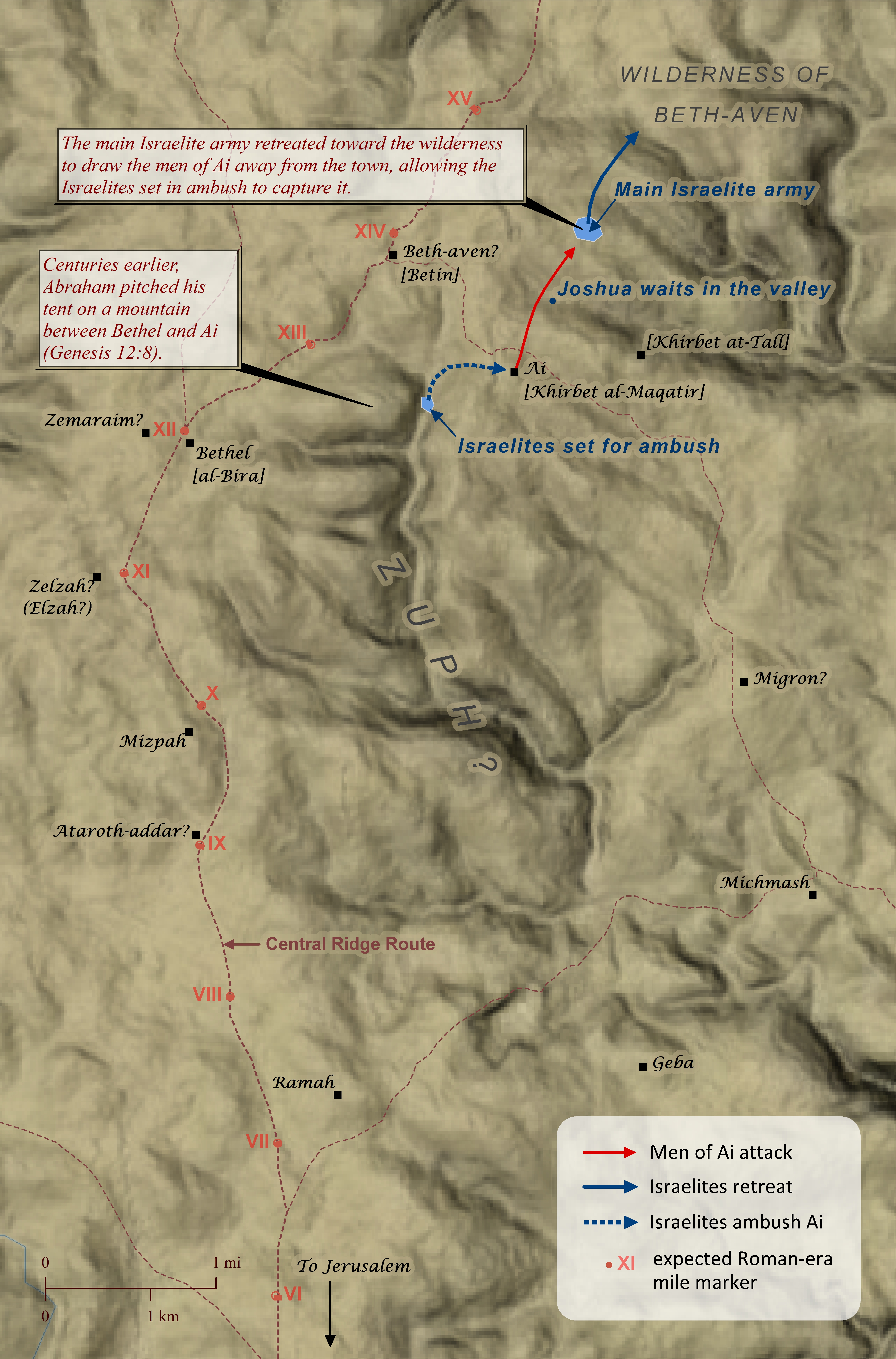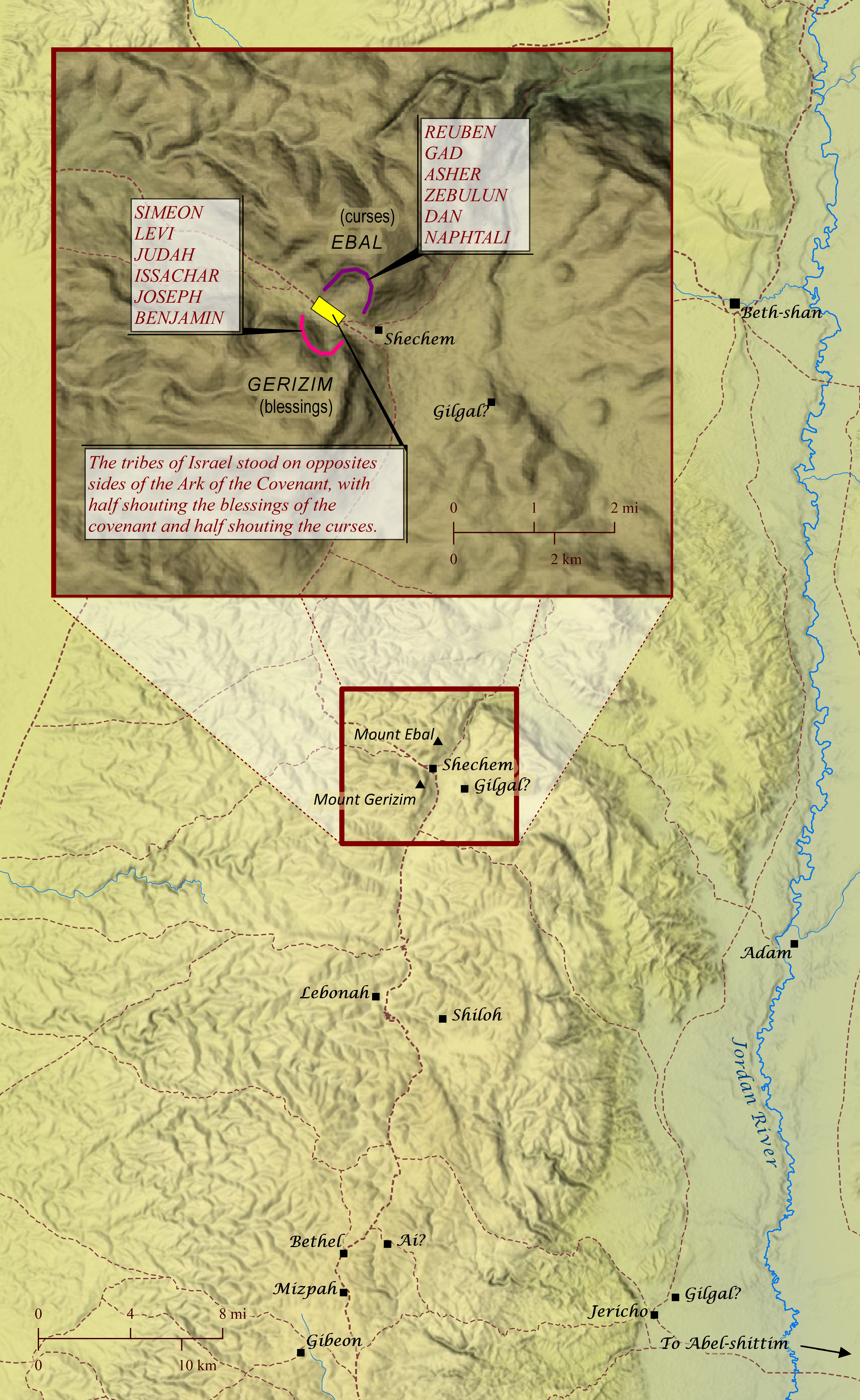Readers’ Version
Literal Version
8 Then Yahweh told Yehoshua, “Don’t be afraid or discouraged. Take all your warriors with you and go to Ay. Listen, I’ve given you victory over Ay’s king and his people and his city and his land. 2 You’ll do to Ay and its king what you did to Yericho and its king,[fn] except that you all can plunder its spoil and its livestock for yourselves. Ambush the city from behind.”
3 So Yehoshua led his warriors towards Ay. He chose thirty thousand of the bravest and strongest warriors and sent them ahead in the darkness 4 and told them, “Listen, you all lie in ambush against the city from close behind it, and make sure you all stay alert and ready to attack. 5 I will bring those warriors who are with me and we’ll approach the city, then when they come out to attack us like last time, we’ll run back away from them. 6 They’ll think we’re running away from them like we did before, so they’ll chase after us until we’ve drawn them away from the city. 7 Then you’ll all move in from your ambush position and capture the city, and your god Yahweh will give the city to you all. 8 After you capture the city, set fire to it. Do what I’ve ordered you all which in turn has come from Yahweh. 9 So Yehoshua sent them to set up the ambush between Ay and Beyt-El (so west of Ay). Meanwhile, he stayed overnight at the camp.
10 Yehoshua got up early in the morning and gathered the warriors, then he and the Israeli elders went in front of them to go and attack Ay. 11 They all went close to the city and camped there slightly to the north, with just a valley between them and Ay. 12 (He had sent around five thousand warriors to lie in ambush between Beyt-El and Ay, west of the city, 13 so the main group was to the north and the rear guard to the west.) That night Yehoshua went down into the valley. 14 When the king of Ay saw the Israelis, he hurriedly got his men ready, and went out early to meet Yisrael for the battle. The king and his people went to a prepared spot overlooking the Yordan valley, but he didn’t know that another group lay in ambush behind the city. 15 Yehoshua and the Israeli group allowed themselves to be struck by them, then they fled back towards the wilderness 16 and all the men in the city were called out to chase them. So they chased after Yehoshua and were drawn away from the city, 17 and there wasn’t a single man left in Ay or Beyt-El who didn’t join the chase—they left the city wide open and chased after the Israelis.
18 Then Yahweh told Yehoshua, “Hold your spear out pointing towards Ay, because I will allow you to defeat it.” So Yehoshua held the spear that was in his hand out toward the city. 19 When the warriors in the ambush saw that, they rushed out from their place and entered the city and captured it, and quickly set it on fire. 20 When the men from Ay turned and looked behind them, the smoke from their city was going up into the sky, but they had nowhere to escape to. Then Yehoshua’s men who’d been fleeing towards the wilderness turned back around towards their pursuers 21 and saw that the ambush had captured the city and the smoke was rising. So they continued back towards Ay, killing their men. 22 Meanwhile, their warriors came back out of the city, so the men from Ay ended up in the middle of the two groups, and the Israelis fought until they’d killed them all. 23 However they captured the king of Ay alive and brought him to Yehoshua.
24 Then after the Israelis had finished killing the men of Ay who had chased them towards the wilderness, they returned to Ay and slaughtered the people still in there, 25 so a total of twelve thousand men and women from Ay were killed that day. 26 Yehoshua didn’t lower his spear until everyone who lived in Ay had been completely destroyed. 27 The Israelis only took the livestock and the goods from Ay, just as Yahweh had instructed Yehoshua, 28 then Yehoshua burnt the city and made it a permanent pile of rubble where no one lives to this day. 29 He hanged the king of Ay on a tree, but as the sun was going down, he commanded that the corpse be brought down from the tree. They threw it into the city gateway and piled a big heap of rocks on top of it which is still there today.
30 Then Yehoshua built an altar to Yisrael’s god, Yahweh on Mt. Eybal[ref] 31 just like Yahweh’s servant Mosheh had instructed them. (It was written in the scroll of the rules from Mosheh that it must be an altar made from whole stones that haven’t been chiselled with iron tools.) Then they offered burnt offerings to Yahweh on it, plus they sacrificed peace offerings,[ref] 32 and while the Israelis watched, Yehoshua inscribed onto the stones there,[fn] a copy of the rules passed on by Mosheh. 33 Then all of Yisrael and their elders and officials and judges were standing some on each side of the box containing Yahweh’s agreement, facing the priests and the Levites who carried the box. Any resident foreigners were also there. Half of the people stood on the Mt. Gerazim side, and half on the Mt. Eybal side of the valley, just like the way that Yahweh’s servant Mosheh had originally commanded for blessing the people.[ref]
34 Then Yehoshua read all the law, including the blessings and the curses, as per everything that’s written in the book of the law. 35 He read out every single word that Mosheh had written, in front of the entire assembly of Yisrael, including the women, children, and foreigners living among them.
8:2 We’re not actually given any details about what happened to the king of Yericho.
8:32 Probably not the altar stones since an iron tool wasn’t allowed to be used on them.
2 And_do to_THE and_to_its just_as you(ms)_have_done/made to/for and_to_its only mmm and wwww to/for_you(pl) wwww to/for_yourself(m) wwww to/for from.
3 And_ Yəhōshūˊa _he/it_rose_up and_all the_people_of the_fighting to_go_up the_ˊAy and_ Yəhōshūˊa _chose thirty thousand man the_mighty_men_of the_valor and_sent_out_them night.
4 And_he/it_commanded DOM_them to_say see you(pl) are_lying_in_wait against_the_city from_behind the_city do_not go_far_away from the_city very and_you(pl)_will_be all_of_you(pl) prepared.
5 And_I and_all the_people which with_me we_will_draw_near to the_city and_it_was if/because they_will_come_out to_meet_us just_as in/on/at/with_first and_flee before_face/front_them.
6 And_come_out after_us until drawn_away_we DOM_them from the_city if/because they_will_say they_are_fleeing before_face/front_us just_as in/on/at/with_first and_flee before_face/front_them.
7 And_you(pl) you(pl)_will_arise from_the_ambush and_seize DOM the_city and_give_it YHWH god_of_your(pl) in/on/at/with_hand_of_your(pl).
8 And_it_was when_taken_you(pl) DOM the_city you(pl)_will_set_on_fire DOM the_city in/on/at/with_fire according_to_message_of YHWH you(pl)_will_do see I_have_commanded DOM_you(pl).
9 And_sent_out_them Yəhōshūˊa/(Joshua) and_went to the_place_of_ambush and_they_lived between Bēyt- ʼēl and_between the_ˊAy to_west of_THE and wwww in/on/at/with (the)_that in_the_middle the.
10 And_ Yəhōshūˊa _rose_early in/on/at/with_morning and_mustered DOM the_people and_he/it_ascended he and_elders_of Yisrāʼēl/(Israel) to_(the)_face_of/in_front_of/before the_people the_ˊAy.
11 And_all the_men the_fighting which with_him/it they_went_up and_drew_near and_they_came before the_city and_camped on_north_of THE and_the them[fn] and_between the.
12 And_he/it_took about_five_of thousand(s) man and_he/it_assigned DOM_them an_ambush between Bēyt- ʼēl and_between the_ˊAy to_west of_the_city.
13 And_stationed the_forces DOM all_of the_camp which to_north_of the_city and_DOM rear_guard_of_its to_west of_the_city and_ Yəhōshūˊa _he/it_went in/on/at/with_night (the)_that in_the_middle the_valley.
14 And_he/it_was when_saw the_king_of the_ˊAy and_hurried and_early_in_the_morning and_they_went_out the_men_of the_city to_meet Yisrāʼēl/(Israel) in_the_battle he and_all people_of_his at_the_meeting_place to_(the)_face_of/in_front_of/before the_ˊₐrāⱱāh and_he not he_knew if/because_that an_ambush to_him/it at_behind the_city.
15 And_ Yəhōshūˊa/(Joshua) _made_a_pretense_of_being_beaten and_all Yisrāʼēl/(Israel) before_face/front_them and_fled the_direction_of the_wilderness.
16 And_ all_of _called_together the_people which in/on/at/with_ˊAy[fn] to_pursue after_them and_pursued after Yəhōshūˊa and_drawn_away from the_city.
17 And_not he_remained anyone in/on/at/with_ˊAy and_Bēyt- ʼēl who not they_went_out after Yisrāʼēl/(Israel) and_left DOM the_city open and_pursued after Yisrāʼēl/(Israel).
18 and_ YHWH _he/it_said to Yəhōshūˊa stretch_out in/on/at/with_javelin which in/on/at/with_hand_of_your to the_ˊAy if/because in/on/at/with_hand_of_your give_it and_ Yəhōshūˊa _stretched_out in/on/at/with_javelin which in_his/its_hand to the_city.
19 And_the_in_the_ambush it_arose quickly from_place_of_his/its and_ran as_soon_as_stretched_out his/its_hand and_they_came the_city and_captured_it and_quickly and_setting_ablaze DOM the_city in/on/at/with_fire.
20 And_ the_men_of _looked the_ˊAy back_them and_they_saw and_see/lo/see it_went_up the_smoke_of the_city the_sky_to and_not it_was in/among_them hands to_flee hither and_that and_the_people the_fleeing the_wilderness it_turned_back against the_pursuers.
21 And_Yəhōshūˊa/(Joshua) and_all Yisrāʼēl/(Israel) they_saw if/because_that it_had_captured the_ambush DOM the_city and_because/when it_went_up the_smoke_of the_city and_turned_back and_struck_down DOM the_men_of the_ˊAy.
22 And_these they_came_out from the_city to_meet_them and_they_were by_Yisrāʼēl/(Israel) in/on/at/with_midst these on_one and_these on_that and_struck_down DOM_them until not left to_him/it a_survivor and_escaped.
23 And_DOM the_king_of the_ˊAy they_captured alive and_brought DOM_him/it to Yəhōshūˊa.
24 And_he/it_was when_finished Yisrāʼēl/(Israel) to_killing DOM all_of the_inhabitants_of the_ˊAy in_the_field in/on/at/with_wilderness which pursued_them in/on/over_him/it all_of_them and_they_fell by_edge_of the_sword until very_last_they and_ all_of _returned Yisrāʼēl/(Israel) the_ˊAy and_attacked DOM_her/it with_edge_of the_sword.
25 And_he/it_was all_of the_fell in_the_day (the)_that from_man and_unto woman were_two_plus ten thousand all_of the_people_of the_ˊAy.
26 And_Yəhōshūˊa not he_drew_back his/its_hand which he_had_stretched_out in/on/at/with_javelin until that he_had_totally_destroyed DOM all_of the_inhabitants_of the_ˊAy.
27 Only the_cattle/livestock and_spoil_of the_city the_that they_plundered to/for_them Yisrāʼēl/(Israel) according_to_message_of YHWH which he_had_commanded DOM Yəhōshūˊa/(Joshua).
28 And_ Yəhōshūˊa _burned DOM the_ˊAy and_made_it a_mound_of perpetuity a_desolation until the_day the_this.
29 And_DOM the_king_of the_ˊAy he_hanged on the_tree until the_time_of the_evening and_at_went_down the_sun Yəhōshūˊa he_commanded and_took_down DOM body_of_his from the_tree and_threw DOM_it to the_entrance_of the_gate_of the_city and_raised on/upon/above_him/it a_heap_of stones great until the_day the_this.
30 then Yəhōshūˊa he_built an_altar to/for_YHWH the_god_of Yisrāʼēl/(Israel) in/on/at/with_mount_of ˊĒyⱱāl.
31 Just_as he_had_commanded Mosheh the_servant_of YHWH DOM the_people_of Yisrāʼēl/(Israel) as_the_written in/on/at/with_book_of the_law_of Mosheh an_altar_of stones complete which not anyone_has_wielded on_them iron and_offered on/upon/above_him/it burnt_offerings to/for_YHWH and_sacrificed peace_offerings.
32 And_wrote there on the_stones DOM (the)_copy_of the_law_of Mosheh which he_had_written to_(the)_face_of/in_front_of/before the_people_of Yisrāʼēl/(Israel).
33 And_all Yisrāʼēl/(Israel) and_elders_of_his/its and_officers and_judges_of_his/its were_standing on_one_side and_on_other_side of_the_box before the_priests the_Levitical who_carried_of (of)_the_box_of the_covenant_of YHWH so_the_alien as_well_as_the_citizen half_of_them was_to the_front of_the_mountain_of of_Gərizīm and_the_half_of_them was_to the_front of_the_mountain_of of_ˊĒyⱱāl just_as he_had_commanded Mosheh the_servant_of YHWH to_bless DOM the_people Yisrāʼēl/(Israel) in/on/at/with_first.
34 And_after thus he_read_aloud DOM all_of the_messages_of the_law the_blessings and_the_curses according_to_all_of the_written in/on/at/with_book_of the_law.
35 Not it_was anything from_all that Mosheh he_had_commanded which not Yəhōshūˊa/(Joshua) he_read_aloud before all_of the_assembly_of Yisrāʼēl/(Israel) and_the_women and_the_little_ones and_the_aliens the_lived in/on/at/with_among_of_them.


